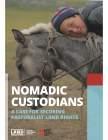Land Library
Welcome to the Land Portal Library. Explore our vast collection of open-access resources (over 74,000) including reports, journal articles, research papers, peer-reviewed publications, legal documents, videos and much more.
/ library resources
Showing items 19 through 27 of 54.Follow Rose, and see her impact, as she travels the Rwandan countryside educating communities about women’s r
This article addresses political rights and identity among Il Chamus of Baringo District, Kenya, a small group of agro-pastoralists related to the Maasai.
The technical guide on improving the governance of pastoral lands is designed for several audiences including government and non-government actors.
The Landesa Center for Women’s Land Rights developed the Women’s Land Tenure Framework to assist anyone who is interested in understanding the complex issues associated with women’s land rights — officials, grassroots organizations, international technical advisers, policymakers, development prac
The first phase of the “Water for Livestock in Isiolo and Garissa Counties, Kenya — Enhancing water resource and rangeland management community capacity through training and strategic water development” has been implemented in in the arid and semi-arid lands of Kenya by IUCN, the Kenya Red Cross
In Senegal, concern about large-scale land acquisitions has been growing since 2000. Senegalese agriculture has long relied on small-scale family holdings and extensive agriculture.
The goal of the Rangelands Initiative is increased tenure security of local rangeland users through improved implementation of enabling policy and legislation.
As part of the Global Call to Action in Indigenous and Community Land Rights, this brief puts the spotlight on the need to secure land rights for the world's pastoralists, as pastoralism is practised by an estimated 200-500 million people. Pastoralists manage rangelands that cover a quarter
Pastoralists have a unique relationship of mutual dependency with their livestock and their environment; the uniqueness of this relationship distinguishes them from other livestock keepers.









